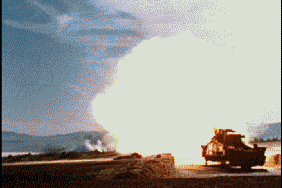In theory, nuclear weapons cannot be tested in the state of Colorado without an affirmative vote by the public in a referendum, according to Article 26 of the State Constitution:
ARTICLE XXVI Nuclear Detonations
Section 1. Nuclear detonations prohibited – exceptions. No nuclear explosive device may be detonated or placed in the ground for the purpose of detonation in this state except in accordance with this article.
Section 2. Election required. Before the emplacement of any nuclear explosive device in the ground in this state, the detonation of that device shall first have been approved by the voters through enactment of an initiated or referred measure authorizing that detonation, such measure having been ordered, proposed, submitted to the voters, and approved as provided in section 1 of article V of this constitution.
Section 3. Certification of indemnification required. Before the detonation or emplacement for the purpose of detonation of any nuclear explosive device, a competent state official or agency designated by the governor shall first have certified that sufficient and secure financial resources exist in the form of applicable insurance, self-insurance, indemnity bonds, indemnification agreements, or otherwise, without utilizing state funds, to compensate in full all parties that might foreseeably suffer damage to person or property from ground motion, ionizing radiation, other pollution, or other hazard attributable to such detonation. Damage is attributable to such detonation without regard to negligence and without regard to any concurrent or intervening cause.
Section 4. Article self-executing. This article shall be in all respects self-executing; but, the general assembly may by law provide for its more effective enforcement and may by law also impose additional restrictions or conditions upon the emplacement or detonation of any nuclear explosive device.
Section 5. Severability. If any provision of this article, or its application in any particular case, is held invalid, the remainder of the article and its application in all other cases shall remain unimpaired.
Anti-test sentiment has run high in Nevada and the nearby Mountain West states in the fallout air path (e.g. Utah and Colorado), ever since the heavy testing in the 1950s in the desert outside Las Vegas.
As an example: In September 2008, Utah’s lone Democratic member of Congress, Rep. Jim Matheson, boldly declared out of nowhere — given ongoing (admittedly voluntary) ban on all U.S. testing since 1992, not to mention the growth of metropolitan Las Vegas over 50 years — that he had “become very concerned about recent Congressional actions that may lead to the resumption of nuclear weapons testing at the Nevada Test Site.” He was convinced, at least for campaign purposes, that test resumption in Nevada was imminent and that his re-election was necessary to stop it from spreading radiation across Utah.
So back to Colorado. Would the State Constitutional ban on in-state nuclear testing actually hold up if it came to it (not that there’s a whole lot of likelihood of such a test being conducted, let alone in Utah)? I suspect not. A nuclear test would fall under the purview of the United States military and the commander-in-chief. The U.S. Constitution puts military decisions squarely in the hands of the Federal executive branch apart from official Declarations of War. And it probably violates the so-called “Supremacy Clause”:
This Constitution, and the Laws of the United States which shall be made in Pursuance thereof; and all Treaties made, or which shall be made, under the Authority of the United States, shall be the supreme Law of the Land; and the Judges in every State shall be bound thereby, any Thing in the Constitution or Laws of any state to the Contrary notwithstanding.
Which is interesting because it makes another potential spot in the Colorado State Constitution that is unconstitutional under the U.S. Constitution.
Still, as Mountain West Supremacy Clause crises go, this is no Bundy Ranch standoff. Plus, one imagines it would be so unpopular for the Feds to override the state’s ban without a referendum that they would simply choose another test location rather than have a court showdown over the Supremacy Clause.

Above: 1953 Operation Upshot-Knothole, Grable Test – Nevada Test Site.


